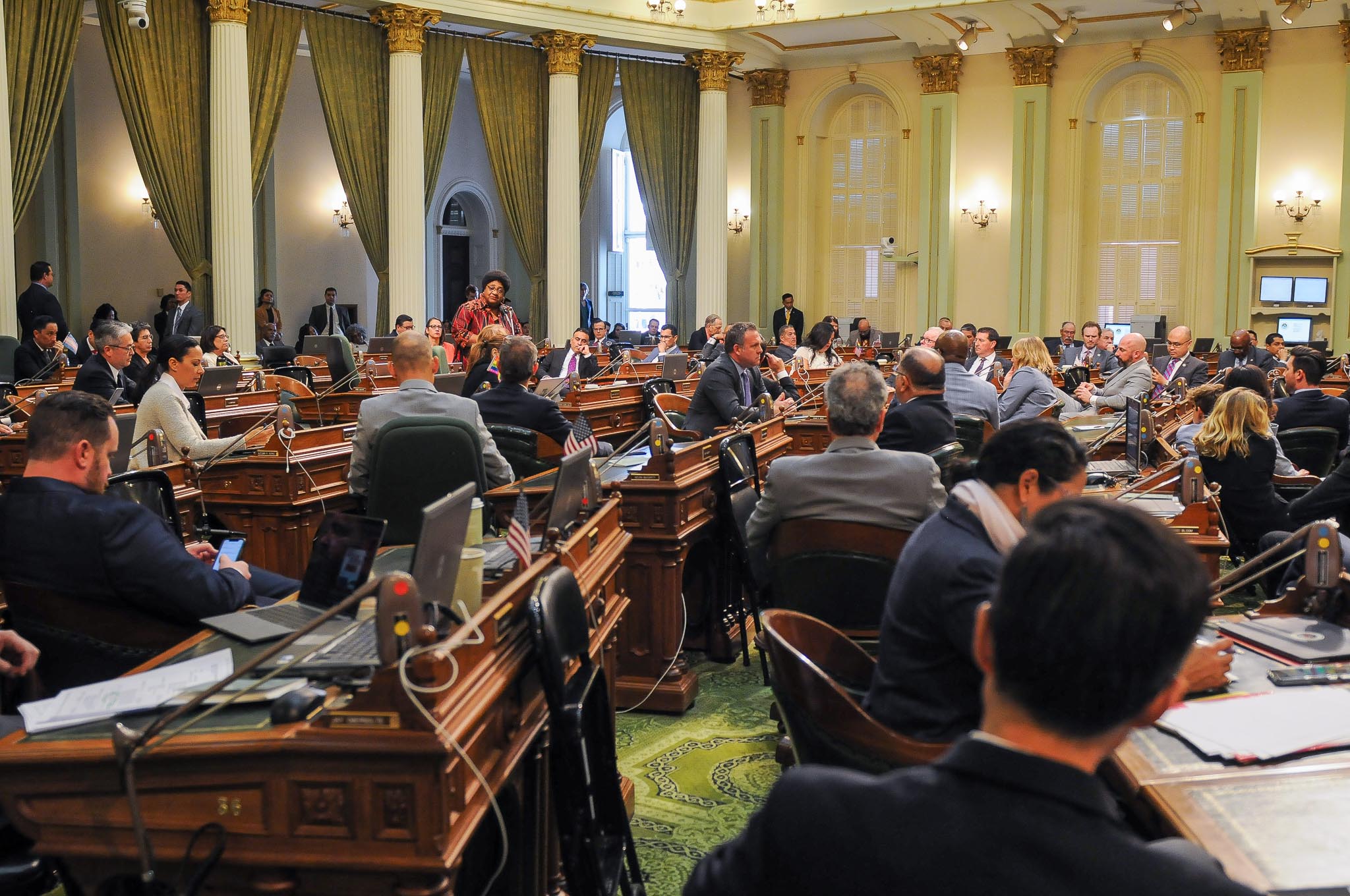
California State Assembly in Session. (Photo: Kevin Sanders for California Globe)
California’s Uniform Foreign Money Claims Act
Applies only to a foreign-money claim in an action or distribution proceeding
By Chris Micheli, June 26, 2022 3:54 pm
California has a number of formal acts in statute. The Uniform Foreign-Money Claims Act is contained in Code of Civil Procedure Part 2 (Of Civil Actions), Title 8.5, which contains Sections 676 to 676.16.
Section 676 provides that Title 8.5 is known and may be cited as Uniform Foreign-Money Claims Act. Section 676.1 defines the following terms: “action,” “bank-offered spot rate,” “conversion date,” “distribution proceeding,” “foreign money,” “foreign-money claims,” “money,” “money of the claim,” “person,” “rate of exchange,” “spot rate,” and “state.”
Section 676.2 specifies that this title applies only to a foreign-money claim in an action or distribution proceeding. In addition, this title applies to foreign-money issues even if other laws under the conflict-of-laws rules of this state apply to other issues in the action or distribution proceeding.
Section 676.3 provides that the effect of this title may be varied by agreement of the parties made before or after commencement of an action or distribution proceeding or the entry of judgment. In addition, parties to a transaction may agree upon the money to be used in a transaction giving rise to a foreign-money claim and may agree to use different moneys for different aspects of the transaction. Finally, stating the price in a foreign money for one aspect of a transaction does not alone require the use of that money for other aspects of the transaction.
Section 676.4 provides that the money in which the parties to a transaction have agreed that payment is to be made is the proper money of the claim for payment. In addition, if the parties to a transaction have not agreed, the proper money of the claim is specified as one of three options.
Section 676.5 provides that, if an amount contracted to be paid in a foreign money is measured by a specified amount of a different money, the amount to be paid is determined on the conversion date. In addition, a monetary claim is neither usurious nor unconscionable because the agreement on which it is based provides that the amount of the debtor’s obligation to be paid in the debtor’s money, when received by the creditor, is required to equal a specified amount of the foreign money of the country of the creditor.
Section 676.6 provides that a person may assert a claim in a specified foreign money. If a foreign-money claim is not asserted, the claimant makes the claim in United States dollars. In addition, the determination of the proper money of the claim is a question of law.
Section 676.7 provides that, with exceptions, a judgment or award on a foreign-money claim must be stated in an amount of the money of the claim. In addition, a judgment or award on a foreign-money claim is payable in that foreign money or, at the option of the debtor, in the amount of United States dollars which will purchase that foreign money on the conversion date at a bank-offered spot rate.
Moreover, each payment in United States dollars must be accepted and credited on a judgment or award on a foreign-money claim in the amount of the foreign money that could be purchased by the dollars at a bank-offered spot rate of exchange at or near the close of business on the conversion date for that payment. Finally, a judgment substantially in the specified form complies with the above requirements.
Section 676.8 provides that the rate of exchange prevailing at or near the close of business on the day the distribution proceeding is initiated governs all exchanges of foreign money in a distribution proceeding.
Section 676.9 provides that, with respect to a foreign-money claim, recovery of prejudgment or pre-award interest and the rate of interest to be applied in the action or distribution proceeding are generally matters of the substantive law governing the right to recovery under the conflict-of-laws rules of this state. In addition, a judgment or award on a foreign-money claim bears interest at the rate applicable to judgments of this state.
Section 676.10 provides that, if an action is brought to enforce a judgment of another jurisdiction expressed in a foreign money and the judgment is recognized in this state as enforceable, the enforcing judgment must be entered as provided under existing law, whether or not the foreign judgment confers an option to pay in an equivalent amount of United States dollars. In addition, a judgment entered on a foreign-money claim only in United States dollars in another state must be enforced in this state in United States dollars only.
Section 676.11 provides that computations are for limited purposes and do not affect computation of the United States dollar equivalent of the money of the judgment for the purpose of payment. In addition, a party seeking process, costs, bond, or other undertaking is required to compute in United States dollars the amount of the foreign money claimed from a bank-offered spot rate prevailing at or near the close of business on the banking day next preceding the filing of a request or application for the issuance of process or for the determination of costs, or an application for a bond or other court-required undertaking.
Section 676.12 provides that, if, after an obligation is expressed or a loss is incurred in a foreign money, the country issuing or adopting that money substitutes a new money in place of that money, the obligation or the loss is treated as if expressed or incurred in the new money at the rate of conversion the issuing country establishes for the payment of like obligations or losses denominated in the former money.
Section 676.13 provides that the principles of law and equity, including the law merchant, and the law relative to capacity to contract, principal and agent, estoppel, fraud, misrepresentation, duress, coercion, mistake, bankruptcy, or other validating or invalidating causes supplement its provisions.
Section 676.14 provides that this title must be applied and construed to effectuate its general purpose to make uniform the law with respect to the subject of this title among states enacting it.
Section 676.15 provides that, if any provision of this title or its application to any person or circumstance is held invalid, that invalidity does not affect other provisions or applications of this title which can be given effect without the invalid provision or application, and to this end the provisions of this title are severable.
- Legislative Records Are Not Proprietary to the State - April 17, 2024
- Frequently Asked Questions about OAL’s Disapproval Process for Regulations - April 17, 2024
- Frequently Asked Questions about of OAL’s Standards of Review for Regulations - April 16, 2024





4 thoughts on “California’s Uniform Foreign Money Claims Act”